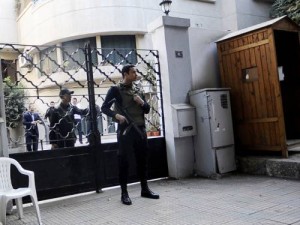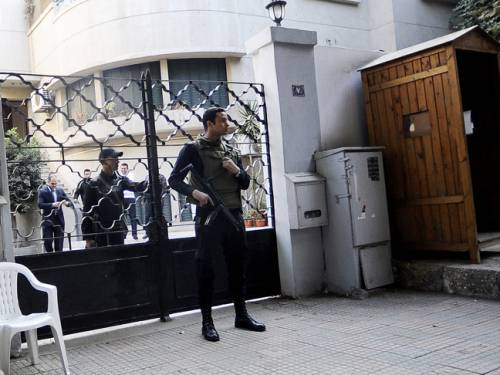
AFP PHOTO
Not only does the 6 April movement reject the draft non-governmental organisation (NGO) law, they want the creation of an additional law that would protect their rights as a political action organisation (PAO).
“The law we are talking about is a political action organisation law,” said 6 April leader Mohammed Adel. “We do not want to be like a political party, we want no control from the Ministry of Finance and we want the freedom to work with any organisation we choose.”
The 6 April movement has joined the chorus in attacking recent developments related to an NGO law being drafted in the current government. Yet even with a reformed law, groups such as 6 April would get left out in the cold entirely, falling between being too political to fit the definition of an NGO, yet having no intention of becoming a political party.
Adel’s group issued a statement saying, “today, we as political movements look for a legal way through this transitional period and toward the pathway to democracy and a democratic society, so that we can serve our country and so that we may have a roll in policy-making.”
“The law they are currently working on is only for NGOs,” said director of projects at United Group (attorneys, researchers, and human rights advocates), Ehab Sallam. “But from my own opinion, as a human rights activist as well as a lawyer, the law should guarantee that these people have enough space and flexibility to be formed.
If they don’t want to be political or civil, it’s okay for them to exist. If [those in government] are worried about the nature of the funds they are getting, they can create a law. They shouldn’t take the easy way out by saying that they just shouldn’t exist.”
In 6 April’s statement they point to the United States which has groups like moveon.org which works in politics to push progressive causes. Because moveon.org is not a political party, regardless of whether a cause garners support from Democrats or Republicans, the PAO still has an opportunity to push for what its supporters value.
The new PAO law demands, among other rights, the right for PAOs to be allowed to organise in public, open bank accounts, and work freely toward raising political awareness inside and outside of Egypt.
These demands for operational freedom also form the nexus of anger over the draft NGO law. Adel said, “we have refused all points of this law.” Now his group is working on drafting a new law to offer as an alternative. They are working with other NGOs and activists such as the Egyptian Center for Economic and Social Rights and activists from the American University in Cairo.
“Our demands from the NGO law are very obvious and clear,” said Sallam. “We want respect for international conventions and respect for the freedom of NGOs.”
One particular issue Sallam took with the new law is the fact that it proposes criminal punishment, as opposed to simply being a regulatory law. “Putting a punishment into the law scares people away,” said Sallam.
Another reason rights groups are angered is the fact that the composition of this law is being carried out in secret. This despite a long process of rewriting the old law and highly publicised fallouts due to confusion around the existing guidelines.
The most extreme example came last December, when more than 40 people were arrested in a government-crackdown on NGOs, in what was seen by many human rights and civil society organisations as a government attempt to limit freedoms. The NGOs were violently raided as computers and files were seized. The NGOs targeted included pro-democracy and human rights organisations.
“There were two different drafting sessions for the NGO laws,” explained Sallam. “The first was from 2007-2009. There were more than 11 NGOs and regional unions from 11 different governorates, trying to work on a draft to solve the previous law.” This period went on for two years in order to attempt fuller inclusion and focused especially on abolishing the preexisting restrictions on NGOs.
Right before the revolution they started working on a total revamp, instead of the tweaking that had been undertaken till 2009, said Sallam. “However, they followed the same mechanism, which was to communicate with different stakeholders, NGOs, regional unions, and this time the Ministry of Manpower and immigration was represented by Minister Ahmed El-Badawi and they also invited the Ministry of Insurance and Social Affairs.”
Then after the revolution, Sallam and others collaborated with parliament to draft a law under the banner of “liberating civil society.” Said Sallam, “it didn’t really matter to us who was drafting the law, as long as we all had the same goal.”
However, after the parliament was dissolved, everything was thrown off track.
Recently, said Sallam, “these civil society organisations found out that the current government is coming up with a whole new draft that is not disclosed to the public. Everything that was leaked does not seem to be good at all for civil society in general.
I am one of the people who is wondering why they wasted the efforts and several drafts that were already made, just to come up with something that does not represent everyone.”


